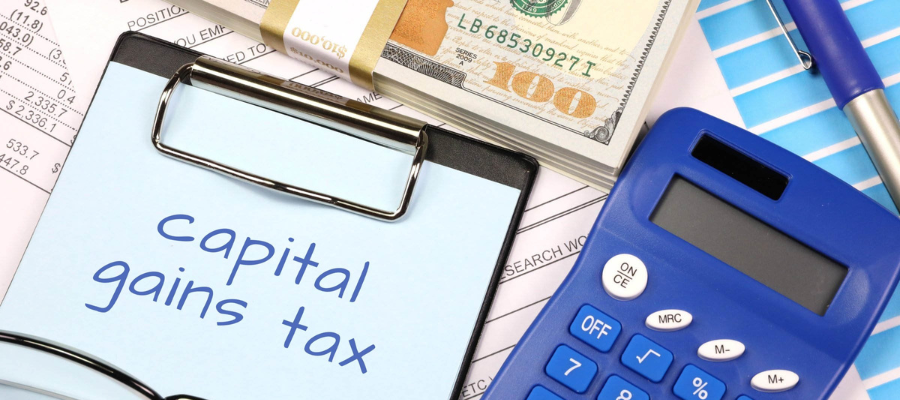
What if you didn’t have to pay capital gains taxes when you sell an investment property?
Deni and Brian break down 1031 exchanges, and what you need to know about using them to defer paying capital gains taxes on real estate when you sell a property.
Video Broadcast Version
Audio Podcast Version
Also available on iTunes, Stitcher, and wherever else you listen 🙂
Resources Mentioned in This Podcast & Video:

Deni: Hello, everybody, and welcome to Sparkrental Facebook Live and Podcast.
Brian: Cheers!
Deni: Brian and Deni here.
Brian: That kinda day Deni.
Deni: Yes. Serious. Anyway, last week we talked about the comparison between real estate and stock returns. And today we’re going to be talking about 1031 and some of the ins and outs of how to transfer a property into 1031 so you can minimize some of your tax liability. So, and I know we get a lot of those questions because it is a little tricky, but it’s probably worth it if your situation is right for it. So go ahead, Brian, and start us off and let us know how this works.
Brian: So, 1031 exchanges, here’s the sky-level view. You sell an investment property, and you take your profits from that property, and you reinvest them into a new investment property. And if you do that immediately or more or less immediately, then you don’t have to pay capital gains taxes on the property that you sold, but you have to reinvest the profits right away, basically.
Deni: So, yeah, there are pretty stringent time frames.
Brian: Oh, yes. And we’re going to go all through that so that you understand exactly what those time frames are. But, you know, first and foremost, this is something that’s only available for investors. Now, you know, the average homeowner might try to whine about this until they realize that they have an even better exemption for their own capital gains taxes on their personal residence. It’s called the primary residence exclusion, also known as a Section 121 exclusion. And it gives you the first $250,000 of profits on your home that you sell. Those are tax-free for capital gains taxes. And if you’re a married couple that doubles to $500,000 in profits tax-free. Now, you must have used that property as your primary residence for at least two of the last five years. And those can be at different time frames. You could move in for a year and then move out for two years and then move back in for another year and then sell the property. And that would count.
Deni: How do they prove that?
Brian: Well, you declare it on your tax return. And if the IRS audits you, then then you have to prove to them that you did live there. But, you know, there are somewhat good public records on this, including in your tax returns. Right. I mean, you file your primary residence and your tax return each year. So, if you try to claim a Section 121 exclusion on a property that you never actually use as your primary residence, the IRS, they know that. So that’s an easy audit trigger for them.
Deni: Gotcha. Tim Dooley says Hi. How are you doing, Tim?
Brian: Hey, Tim. Always, always good to have you around Norfolk. He says Tim’s from Norfolk, Virginia.
Deni: Oh, I didn’t even know what that meant, and I didn’t want to say it because the last part was kind of a bad one. Anyway, back to our subject. So, to you, how do I know you need a person involved in this? You can’t just hold them money yourself from the sale of your house, the whole thing.
Brian: Right. So, you need to hire what’s called a qualified intermediary and this is basically someone to hold your funds in escrow and manage the legal paperwork for you. So, you pay someone a small fee to do this. There are a bunch of companies out there that offer this service. You pay them a small fee, and as I said, they file the tax paperwork with the IRS, or at least they prepare it for you to file. And when you sell your old property, they will hold your proceeds from that in escrow until you buy the new property, and they will transfer the money for you to the settlement table when you buy the new property.
Deni: Okay, cool. So, what are the benefits? Can we talk about some of the benefits of all this?
Brian: Well, there’s exactly one benefit, and that is you defer paying capital gains taxes when you sell an investment property. Now, you will still need to pay capital gains when you go to sell the new property that you buy unless you 1031 exchange that property so you can keep kicking the ball down the road. Oh so. And keep. All your profits from an old property into a bigger and better and more lucrative new property indefinitely. But if and when the time ever comes, when you sell one of these investment properties and you don’t do a 1031 exchange to buy a new property at that time, you will owe capital gains taxes on all of your profits from that property.
Deni: So, if you sell your property and if settlement doesn’t occur in the time frame, then then you lose all those benefits.
Brian: So, then you have to pay capital gains taxes on the property you sold.
Deni: Okay. We have somebody said great topic. I am helping people with a capital gains trust strategy that delays the taxes as well. So, this is definitely a good way for a real estate investor to defer some of these taxes or minimize them.
Brian: Yeah. And you know, on that topic of kicking the can down the road and continuing to 1031 exchange your profits from one property into a bigger property, into a bigger property, if you die without ever having sold one of these properties and not 1031 exchanging it, know, if you keep that final property in the chain until you die, then you don’t pay any capital gains taxes on any of them ever. And upon your death, your cost basis resets to whatever the value of that property is at the time of your death. And it goes into your estate and your children might pay estate taxes, but only if your total estate exceeds the estate tax exemption, which is pretty high right now. What is it, 12 point something million dollars per person? Yeah. Now, and that will probably go down again in the coming years because I think that is scheduled to reset in a few years from now to a lower amount. But anyway, we’re getting off track from 1031. But the point is that you can theoretically use this strategy to never, ever pay capital gains tax on any of your properties. If you keep the chain going, you keep rolling your profits from one property into a new property every time you sell them.
Deni: And you can use this with vacation properties. So, you could still use the vacation property, right. Brian And then.
Brian: You sort of. It still needs to be an investment property. You are allowed a certain amount of time of personal use each year, but that is limited to 14. Well, so yeah. So, 14 days of use or 10% of the time that it was rented in that year, whichever is greater. That’s if you want to 1031 an old property into a new vacation rental. Yeah. You still need to use it as an Airbnb rental property for the next two years at least. But you can use it for up to 14 days a year or up to 10% of the amount of time that it was rented each year.
Deni: It’s not bad for getting the tax break and still getting to have a vacation on your property.
Brian: Yeah, absolutely.
Deni: Just to let everybody know I put a calculator link in the chat and that goes to the property depreciation calculator.
Brian: Right. This is a point we actually haven’t touched on yet, but that’s an important point. When you do a 1031 exchange, you also defer paying depreciation, and recapture on that property. Now, again, you will owe it when you sell the new property unless you roll that new property into another new property when you saw that one. So. But yeah, depreciation for anyone who’s not familiar with it, you can depreciate the cost of the building for the first 27 and a half years that you own the property. It’s a tax deduction that you take each year basically. 1/27.5 of the building value and but when you go to sell a property you have to pay that money back to the government. So, it’s almost like a free interest-free loan that you take from the IRS, but you do have to pay it back. You have to pay depreciation back when you sell the property. Unless you do a 1031 exchange, you also get to defer depreciation recapture in addition to capital gains tax.
Deni: So, this is a pretty good strategy really for a real estate investor.
Brian: Yeah. So, the broad strategy looks something like this. You know, you go out as a new investor who doesn’t have a ton of cash and you buy a single-family rental property or some sort of small, affordable rental property that doesn’t cost you a ton of money. And then a few years go by, it appreciates in value a little bit. You’re earning some money on cash flow, and you decide to sell that small, cheap, single-family property and use the proceeds from it to buy, let’s say, a duplex. That cash flow is better, right? So, you go out, you sell your single-family rental, and you take the proceeds, and you buy a bigger, more expensive duplex with better cash flow. Do a 1031 exchange. You don’t have to pay any capital gains taxes when you sell the single-family rental, and then a few more years go by, you earn some more money. The new property appreciates some, and then you decide to sell that property, the duplex and roll the funds into buying a fourplex. That cash flow is even better, right? And all the while.
Deni: You live in one of them. Like, can you live from one side of the duplex and still do this?
Brian: No. Well, again, for you, you would get an even better exemption. You would get the primary residence exclusion for that.
Deni: Gotcha.
Brian: So, yeah, you wouldn’t you actually wouldn’t want to do a 1031 exchange because you’d have a Section 121 exclusion, you know, the primary residency exclusion, which is even better. Gotcha. But the idea is that you keep rolling, you keep this chain going where you keep buying bigger and better cash flowing properties. Each time you sell your old house, you roll the proceeds into a bigger property. The cash flow is better until eventually, you’ve got a 10-unit, 20-unit, whatever property, that cash flows really well and you never had to pay capital gains taxes along the way.
Deni: That’s amazing.
Brian: Now, we should talk about the time limits involved because those are very strict. And you need to know these if you are thinking about doing a 1031 exchange. So, you sell your old property, you have 45 days to declare a new property that you plan on buying to replace it. Now you can identify up to three different options for new properties, because the IRS understands that real estate investing is not always an exact science. Sometimes deals fall through whatever. So, within 45 days of selling your old property, you have to declare up to three different options for new properties that you’re planning on buying to replace the old one. And then you need to settle on one of those three new properties within 180 days of selling your old property. And when we talk, when we say buying or selling, we’re talking about the actual settlement date of both.
Deni: Wow. So, you really have to I mean, especially in today’s market where things are gone quickly, you really have to have a good strategy in place.
Brian: Yeah.
Deni: And this.
Brian: Yeah. So, this is where the qualified intermediary comes into place here. You, you declare to them what your three options for new properties will be. They will document that they will prepare the tax statements for you. But yeah, you have to declare it to them, basically.
Deni: Gotcha. Wow!
Brian: Yeah. It’s a great strategy. It does add a level of complexity here. But if you are looking to build your portfolio and cash out your older, smaller properties in favor of buying larger, better cash-flowing properties, this is a perfect strategy to do that.
Deni: Awesome! I am also going to throw an article all about capital, and a link to an article about capital gains. And then shortly thereafter I will be sharing one on this strategy.
Brian: Yeah. So, we have a detailed article with more details about how this process works if you want to read further. And we do have an article also about other ways that you can either defer or minimize or avoid entirely capital gains taxes on real estate investment properties. And I see Paul Bax here says he says, I hear Del Wamsley talk about this all the time. I don’t know Del Wamsley, but it sounds like a smart guy who knows what he’s talking about. Deni is there anything else that you want to cover about 1031 exchanges before we call this episode complete.
Deni: Just make sure that you talk to somebody like an intermediary and your financial Accountant or whatnot, you know, just to make sure that you’re doing all this right.
Brian: Yeah. And it always helps to speak with an expert just to make sure that your strategy and your plans are all aboveboard and that you’re not missing some critical piece of the puzzle. So, if you’re thinking about doing this, you know, do a little Internet research on qualified intermediaries, call up a couple of them, talk through the process with them, make sure that you understand exactly how it works because you can get tripped up on some of the details here. So, make sure you have a very solid grasp of how it works.
Deni: Absolutely. Well. I think we’re at the end of this episode. We’ll be back next week, or I’ll be back next week. You won’t be back next week.
Brian: I’ll be in Uruguay next week.
Deni: Poor guy.
Brian: I’ll do a little wine tasting. I’m excited tonight.
Deni: I’ll be here.
Brian: All right, guys. We’ll see you soon. Keep us posted about what you want to hear about in future episodes. And we will talk to you soon.
Deni: Have a great day.























